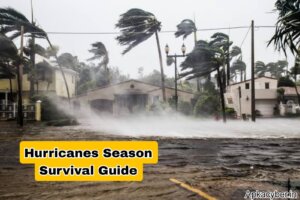
Hurricanes are some of the most destructive natural disasters on Earth. Known for their powerful winds, heavy rainfall, and potential for widespread devastation, these storms can have a profound impact on communities, economies, and ecosystems. In this article, we will explore what hurricanes are, how they form, their categories, and tips for preparation and safety.
What is a Hurricane?
A hurricane is a type of tropical cyclone, a large storm system characterized by low atmospheric pressure, strong winds, and heavy rain. Hurricanes form over warm ocean waters, usually when sea surface temperatures exceed 80°F (27°C). These storms can produce wind speeds exceeding 74 miles per hour, making them extremely dangerous.
How Do Hurricanes Form?
Hurricanes develop through a series of stages:
- Tropical Disturbance: The process begins with a cluster of thunderstorms over warm ocean waters.
- Tropical Depression: If the disturbance organizes and increases in intensity, it becomes a tropical depression, with sustained winds of up to 38 mph.
- Tropical Storm: Once winds reach 39 mph, the system is classified as a tropical storm. At this point, it receives a name.
- Hurricane: If the storm intensifies and wind speeds exceed 74 mph, it is classified as a hurricane.
Hurricanes are categorized on the Saffir-Simpson Hurricane Wind Scale, which ranges from Category 1 (minimal damage) to Category 5 (catastrophic damage).
The Impact of Hurricanes
Hurricanes can cause extensive damage through strong winds, storm surges, and flooding. Here are some of the primary impacts:
- Wind Damage: High winds can destroy buildings, uproot trees, and knock down power lines.
- Storm Surge: This phenomenon occurs when strong winds push ocean water onto land, leading to coastal flooding. Storm surges can be particularly dangerous and are often the leading cause of hurricane-related fatalities.
- Flooding: Heavy rainfall from hurricanes can result in inland flooding, overwhelming rivers and drainage systems. Flash floods can occur rapidly, posing a significant risk to life and property.
- Economic Impact: The financial costs of hurricanes can be staggering, including damage to infrastructure, loss of business, and the expense of emergency response and recovery efforts.
Hurricane Preparedness Tips
Preparation is key to minimizing the risks associated with hurricanes. Here are essential tips to ensure your safety and the safety of your loved ones:
- Stay Informed: Monitor weather reports and heed warnings from local authorities. Websites like the National Hurricane Center provide real-time updates.
- Create an Emergency Plan: Discuss and establish a family emergency plan that includes evacuation routes and communication methods.
- Build an Emergency Kit: Your kit should include non-perishable food, water, medications, flashlight, batteries, and first-aid supplies.
- Secure Your Property: Reinforce windows and doors, and remove outdoor items that can become projectiles in high winds.
- Know Your Evacuation Routes: Familiarize yourself with local evacuation routes and shelters. In the event of a mandatory evacuation, leave early to avoid traffic and ensure safety.
Conclusion
Understanding hurricanes is crucial for preparedness and safety. By staying informed and taking proactive steps, you can protect yourself and your community from the devastating effects of these powerful storms. As hurricane season approaches, ensure you are ready for any eventuality. Remember, being prepared can make all the difference when nature unleashes its fury.